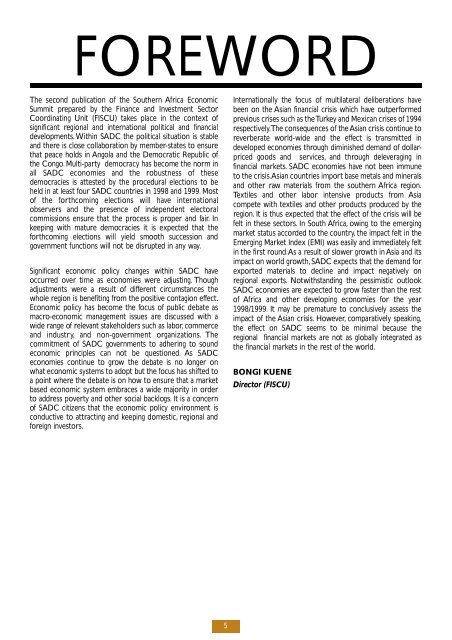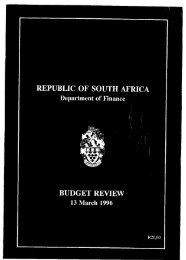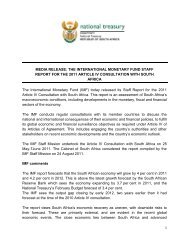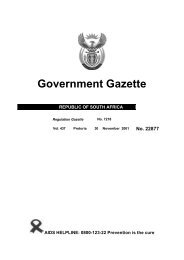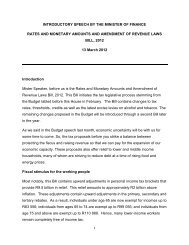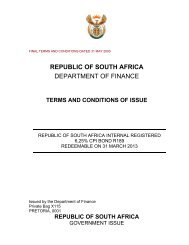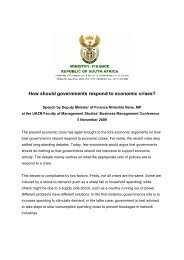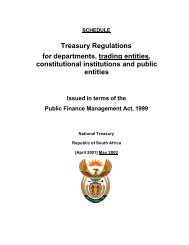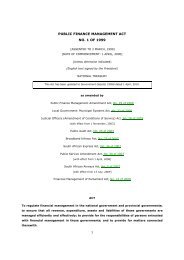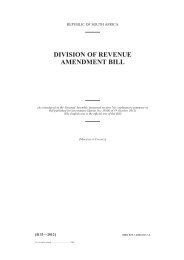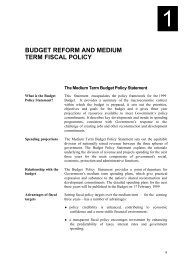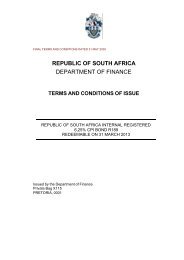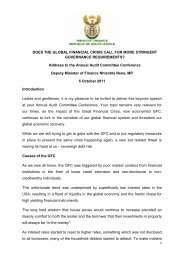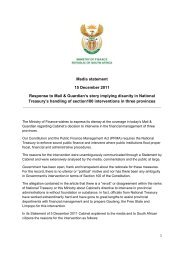1998 SOUTHERN AFRICA ECONOMIC ... - National Treasury
1998 SOUTHERN AFRICA ECONOMIC ... - National Treasury
1998 SOUTHERN AFRICA ECONOMIC ... - National Treasury
You also want an ePaper? Increase the reach of your titles
YUMPU automatically turns print PDFs into web optimized ePapers that Google loves.
FOREWORD<br />
The second publication of the Southern Africa Economic<br />
Summit pre p a red by the Finance and Investment Sector<br />
C o o rdinating Unit (FISCU) takes place in the context of<br />
significant regional and international political and financial<br />
d eve l o p m e n t s .Within SADC the political situation is stable<br />
and there is close collaboration by member-states to ensure<br />
that peace holds in A n gola and the Democratic Republic of<br />
the Congo. M u l t i - p a rty democracy has become the norm in<br />
all SADC economies and the robustness of these<br />
democracies is attested by the procedural elections to be<br />
held in at least four SADC countries in <strong>1998</strong> and 1999. M o s t<br />
of the fo rthcoming elections will have international<br />
o b s e rvers and the presence of independent electoral<br />
commissions ensure that the process is proper and fair. I n<br />
keeping with mature democracies it is expected that the<br />
fo rthcoming elections will yield smooth succession and<br />
government functions will not be disrupted in any way.<br />
Significant economic policy changes within SADC have<br />
o c c u rred over time as economies we re adjusting. T h o u g h<br />
adjustments we re a result of diffe rent circumstances the<br />
whole region is benefiting from the positive contagion effe c t .<br />
Economic policy has become the focus of public debate as<br />
m a c ro-economic management issues are discussed with a<br />
wide range of re l evant stakeholders such as labor, c o m m e rc e<br />
and industry, and non-government organizations. T h e<br />
commitment of SADC governments to adhering to sound<br />
economic principles can not be questioned. As SADC<br />
economies continue to grow the debate is no longer on<br />
what economic systems to adopt but the focus has shifted to<br />
a point where the debate is on how to ensure that a marke t<br />
based economic system embraces a wide majority in ord e r<br />
to add ress pove rty and other social backlogs. It is a concern<br />
of SADC citizens that the economic policy env i ronment is<br />
c o n d u c t i ve to attracting and keeping domestic, regional and<br />
fo reign inve s t o r s .<br />
I n t e r n a t i o n a l ly the focus of multilateral deliberations have<br />
been on the Asian financial crisis which have outperfo r m e d<br />
p revious crises such as the Tu r key and Mexican crises of 1994<br />
re s p e c t i ve ly.The consequences of the Asian crisis continue to<br />
reverberate world-wide and the effect is transmitted in<br />
d eveloped economies through diminished demand of dollarpriced<br />
goods and serv i c e s , and through deleveraging in<br />
financial marke t s .SADC economies have not been immu n e<br />
to the crisis.Asian countries import base metals and minerals<br />
and other raw materials from the southern Africa re g i o n .<br />
Textiles and other labor intensive products from A s i a<br />
compete with textiles and other products produced by the<br />
re g i o n .It is thus expected that the effect of the crisis will be<br />
felt in these sectors. In South A f r i c a ,owing to the emerging<br />
m a r ket status accorded to the country, the impact felt in the<br />
Emerging Market Index (EMI) was easily and immediately fe l t<br />
in the first ro u n d .As a result of slower growth in Asia and its<br />
impact on world grow t h ,SADC expects that the demand fo r<br />
e x p o rted materials to decline and impact negative ly on<br />
regional export s . Notwithstanding the pessimistic outlook<br />
SADC economies are expected to grow faster than the re s t<br />
of Africa and other developing economies for the ye a r<br />
<strong>1998</strong> / 1999 .It may be pre m a t u re to conclusive ly assess the<br />
impact of the Asian crisis. H oweve r, c o m p a r a t i ve ly speaking,<br />
the effect on SADC seems to be minimal because the<br />
regional financial markets are not as globally integrated as<br />
the financial markets in the rest of the wo r l d .<br />
BONGI KUENE<br />
D i rector (FISCU)<br />
5


